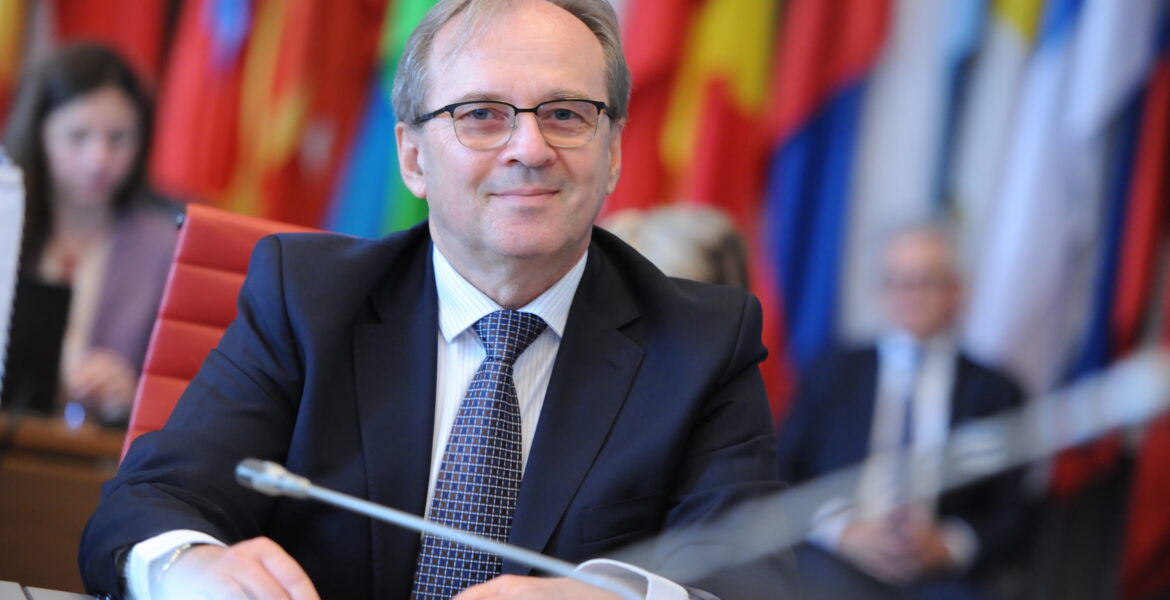Adam Hałaciński, Poland’s Ambassador to the OSCE, speaks about the roots of the organization, its strengths and weaknesses and Poland’s 2022 OSCE Chairmanship.
You already served in the Permanent Mission of Poland to the OSCE between 1993 and 1999, since January 20, 2020 you are Permanent Representative. What are the most significant changes the OSCE has gone through in that period?
Indeed, I had the privilege of working throughout the nineties for Poland’s delegation in Vienna. It was a time of ongoing democratic and economic transition in large parts of the OSCE area. The work was driven by a common desire of participating states to make the best out of it. It was still the aftermath of the fall of the Iron Curtain, filling the atmosphere and the content of co-operation with enthusiasm and the will for change. Shared values, principles and commitments were key points of reference for shaping the agenda. A spirit of constructive negotiation prevailed, most visible in the field of arms control and confidence building. You may recall that Poland held OSCE Chairmanship in 1998. While chairing the organization, we took advantage of the political will of participating states to meet security challenges across the OSCE’s three dimensions together. I would wish for a “renaissance” of similar approaches nowadays, in times of challenged basic OSCE principles, escalating conflicts, growing mistrust and dropping good will for the sake of narrow interests. Of course, the OSCE has developed significantly over the last two decades, building up its toolbox, expertise, institutions and presence in the field. All of them can be rightly considered as OSCE’s value added and proof of its uniqueness. The comprehensive approach to security, encompassing politico-military, economic, environmental, and human rights aspects was a good choice, however implementation of commitments remains steadily a task ahead of us.
The OSCE is – amongst other things – a platform for political dialogue. What are the main mechanisms of the OSCE to enable a fruitful discourse? And what are, in your opinion, the weaknesses of the organization?
One should be realistic when talking about OSCE’s capability to have impact. European security remains in crisis and reasons for this situation are rooted too deeply to allow this organization to provide the miraculous remedy. However, the OSCE helps to keep channels of communication open among all participating states. A strength of this organization has always been inclusiveness of the co-operation and equality of members, as well as decision-making based on the consensus rule. Our main focus in challenging times like now should be to reflect upon the value of these basic parameters. I would wish to see a shift from multiplied misuse of consensus towards more ownership and accountability in decision-making. Of course, the main prerequisite in this regard is political will. The OSCE will be as strong as the participating states want it to be. As Foreign Minister Rau said during a presentation of the outlook for Poland’s OSCE Chairmanship 2022: There is no need to reinvent the wheel, but we must ensure that the wheel keeps going as smooth as possible.
The OSCE’s Office for Democratic Institutions and Human Rights is located in Warsaw. The Covid-19 crisis brought forth new challenges for societies in the field of human rights. What are the office’s strategies for dealing with these problems? How was this development addressed in the OSCE discussions?
Poland is proud to host the OSCE Office for Democratic Institutions and Human Rights (ODIHR) along with the annual Human Dimension events. We strongly support ODIHR’s autonomy and highly value its expertise which it successfully developed over the years. The Warsaw-based Human Dimension Implementation Meeting is the largest event of its kind in the OSCE region, gathering several hundred participants, including government officials, international experts, human rights activists and civil society representatives, providing them with a unique opportunity to network and exchange. We hope to meet them again this fall.
You are right, the pandemic brought forth numerous challenges for human rights. In different OSCE fora, including the Human Dimension Committee, Supplementary Human Dimension Meetings and in the framework of other events, participating states, assisted by ODIHR, tried to identify and address these challenges, focusing inter alia on restrictions in public life imposed by authorities due to the spread of coronavirus. ODIHR’s recent report on Human Dimension Commitments and State Responses to the Covid-19 Pandemic, addresses lessons learned from the pandemic and recommends how to strengthen institutions of participating states in view of future challenges. The key consideration is that measures taken by governments should be proportionate, temporary and in compliance with the rule of law, international obligations and OSCE commitments. They should not be used to restrict the work of human rights defenders, journalists, media actors and civil society organisations. I very much hope that this message has been noted across the OSCE area.
Poland is assuming the chair of the OSCE in 2022. What are the main objectives on the Polish agenda?
We perceive our task as a natural building block of our international engagement. May I just refer to Poland’s quite recent non-permanent membership in the United Nations Security Council and ongoing membership in the Human Rights Council, our contributions to the work done in global and regional international undertakings. Our approach to the upcoming Chairmanship is to offer Poland’s political commitment, experience and assistance. Our decision was based on the high value attached to the OSCE as a useful forum for promoting stability and co-operation among 57 participating states. We firmly hope and believe, that the participating states can recommit themselves to the OSCE’s comprehensive approach to security. Despite the complex security situation in the OSCE area, our aim will be to make all efforts to rebuild confidence and trust, and to act as an honest broker, while preserving respect for the basic OSCE principles and commitments enshrined in the Helsinki Final Act and subsequent documents.
Foto: OSCE/Micky Kröll

